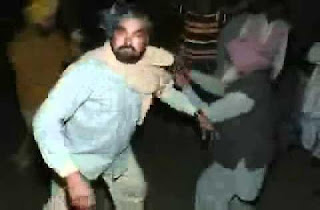Last evening I attended a film screening at the School of Arts & Aesthetics at the Jawaharlal Nehru University in Delhi. The film was Kundan Shah's 'Teen Behenein' (completed in 2005, not seen in theatres till date) travelling the country in its DVD avatar with Chief Associate Director Shekhar Hattangadi. It is thematically rooted in the dowry-related triple suicides in 1988 Kanpur, when three sisters decided to end their lives to save their parents the burden of getting them married off. (The filmmakers are at pains to clarify that this is not a biographical representation of the tragedy. The incident only serves as a take-off point for what is most certainly fiction.)
Cinematically, it's a simply treated film with its share of flaws that
other reviewers have described better than I could. As for me, I found it extremely well researched and nuanced in terms of the characters' dilemma, their inner workings and the societal pressures they eventually succumb to.
It wasn't an easy film to watch. I'm one of two sisters fortunate to have been born to people who were excited to have us. (My doctor mother would tell us stories of her patients asking, "Only two daughters? No sons?" Then she'd proudly re-enact the feminist lectures she'd give them.) Growing up, my parents were focused on us getting degrees, building a profession and being financially independent. At no point was marriage the sole purpose of our existence, at no point was getting us married, theirs. Still, the film made me uncomfortable - but for a twist of fate, my sister & I could just as well been the siblings in Teen Behenein.
I was riveted. It brought back memories from when I was 9 yrs old and saw the front-page photograph of three hanging girls - such young girls too - and thinking: what would make you so miserable that you'd want to do
that? The film laid it all bare in stunning and painful detail.
Then someone in the audience giggled. Her laughter caught on and soon her friends were giggling too. I can't claim to know what they found so funny but was taken aback by how different our viewing experiences were. Once the screening was over, the floor opened up to questions & comments. No one was curious about the characters or the story (or even the process of arriving at that particular cinematic treatment) but there were plenty of comments - some felt the film had a 'narrow' perspective because the girls had no aspirations besides marriage & that dowry was too trivial a matter to elicit suicidal decisions. Some commented on how showing the sisters deriving strength from praying to Krishna was too 'romantic' and 'took away from the seriousness of the issue'. Other commenters, Shekhar told me later, took offense at the portrayal of educated young women, who 'gave in so easily'. 'Feminists', Shekhar said, were amongst the least impressed with Teen Behenein's story.
To me, their comments indicated a fundamental disconnect with the reality that countless Indian women live out every single day. It is a hard fact that, like in the film, many women are brought up to think they are mistakes, that they are the sole cause of their parents' unhappiness. (Like in the film, it is also hard fact that these women are often highly educated.) It's fact that these women derive their sense of belonging from their marriage-worthiness. Fact that they don't see education as a stepping stone to emancipation. Fact that they do not define emancipation the way I do. Fact that some of them subvert their identities to such an extent that, like the eldest sister in the film, they believe even their dreams don't belong to them.
Earlier this year, while researching reproductive health issues I interviewed a bunch of young married girls, ironically, in Kanpur. Many were college graduates yet couldn't speak to me directly. Every time they tried, their mothers in law would answer on their behalf.
They were all aware of the contraception options available (even the newly introduced '
injection' method that I'd been blissfully unaware of until I took on the project), the risks involved and the procedures they could get done. Most of them had no desire for more children, yet were unwilling to practice anything besides the most traditional (and largely ineffective) methods.
"Why?" I asked incredulously.
"Because." They answered. Just that - because.
Their mothers-in-law glared at me for asking such questions. I knew then that these girls had handed over complete control of their bodies to someone else. When I asked one 21 yr old girl with 3 children, what she was hoping would prevent another conception, she said: "
Krishan bhagwan hai na."
Of course, I'm fortunate to have this perspective largely thanks to where my job takes me and I can't speak for the experiences viewers in yesterday's audience have had. But it upsets me that they refused to validate the Teen Behenein sisters' story as plausible (or that they accused the filmmakers of projecting an inaccurate picture of reality). It upsets me that some of the most privileged members of the audience thought the story was either so unreal that it was funny, or told so badly told that it misrepresented Indian women. Most of all, it scares me how blind our privileges have made us to how close we've all come to being one of the Teen Behenein.
But for a twist of fate it could have all been so different.






